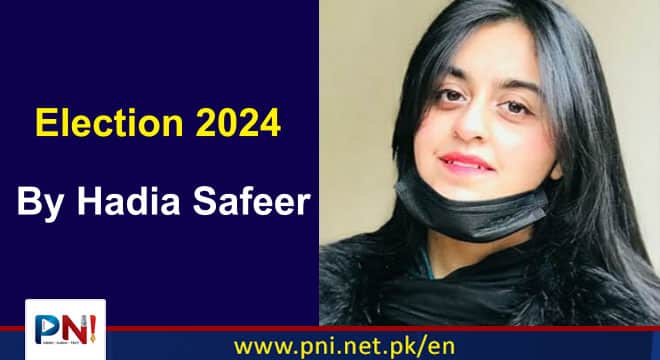INTRODUCTION:
Like in many democracies, Pakistani elections involve a complicated combination of personal preferences, societal forces, and political strategies. The country’s general elections in 2024 provide a distinctive perspective on the fascinating phenomenon of voters motivated by emotions, particularly a strong desire for vengeance. The dominant voting behaviors, which exposes a political environment in which sentiments that are subjective frequently take precedence over logic. Notwithstanding social backgrounds and levels of education, the electorate’s choices appear to be deeply influenced by gut feelings, exposing a complex facet of Pakistani democracy.
The story that is being told about the 2024 elections is that the electorate is motivated by an urge for revenge. This emotional undertone denotes a shift from traditional political incentives, like party loyalty or policy considerations. Rather, it reveals a public that is navigating the political system via a lens based on private grievances and revenge. The question that emerges is whether this trend of revenge-driven voting is a reflection of larger socio-political dissatisfactions or a calculated change in the way people view their influence over the course of the country.
THE BLAME-GAME: BIRYANI POLITICS V/S REVENGE VOTES
Pakistani elections are notoriously riddled with contradictions; ‘biryani politics’ and revenge-based voting create an odd contrast. Part of the electorate, purportedly motivated by an impression of political awareness or ‘wokeness,’ engages in vengeance voting while concurrently denouncing the practice of ‘biryani politics.’ This paradox calls attention to the subtle nuances of voter behavior, wherein voters who appear to have different preferences nonetheless make similar decisions. The term “biryani politics” refers to a reported tendency in which people attend political rallies primarily to participate in the anonymous distribution of biryani, rather than out of real political interest.
However, the 2024 elections see a rise in revenge-motivated voting, when feelings take precedence over reason. The irony occurs when those who participated in the vengeance vote—often regarded as more “woke” or “politically aware”—blame the biryani vote, characterizing it as a frivolous and superficial decision. In real terms, the distribution of food—represented by biryani plates—serves as a concrete illustration of the socioeconomic challenges that the nation faces.
It draws attention to the terrible conditions that a large segment of the populace faces, where the attraction of a free lunch transcends politics. Instead, it serves as a harsh reminder of the socioeconomic hardships that impoverished communities face, transforming an apparently insignificant act into a potent representation of economic inequality.
STRATEGIC COMMUNICATION AND VOTER’S DYNAMICS IN PAKISTAN’S POLITICAL LANDSCAPE:
Parties in Pakistani politics maneuver through a complicated web of voter dynamics, each using a different set of tactics to strengthen their base and draw in swing votes. Two of the nation’s most significant political parties, the Pakistan People’s Party (PPP) and the Pakistan Muslim League-Nawaz (PML-N), take different tacks while interacting with voters in the midst of a contentious political environment. As the PPP seeks to capitalize on the’revenge vote’ of dejected Pakistan Tehreek-e-Insaf (PTI) supporters, the PML-N, facing obstacles from the political crisis ascribed to the Pakistan Democratic Movement (PDM) coalition government, focuses its communication strategy on its core supporters.
The idea of a “revenge vote” is starting to take center stage in Pakistani politics. Voters who choose to support opponents as a form of electoral retaliation after feeling deceived or disappointed by the parties they had previously supported are the main cause of this phenomenon. The PPP’s tactic to capitalize on this feeling among PTI supporters demonstrates its flexible thinking, as it understands that these highly charged votes have the ability to tip the electoral scales in its favor.
The PML-N, in contrast to the PPP, has opted to concentrate on a distinct communication strategy that prioritizes the consolidation of its historic voter base. The PDM coalition has created a political dilemma, but the PML-N’s base of devoted supporters is still largely intact. But this crisis has eroded what are known as “seasonal votes”—voters whose loyalty changes in reaction to immediate political complaints or current political trends. The existing politics of retribution have an impact on these holiday votes, which presents an obstacle and a chance for the PML-N. The party’s chances of winning elections may be hampered by its unwillingness or incapacity to successfully engage these unstable voting segments.
PTI’s STRATEGIC SHIFT TOWARDS THE REVENGE VOTE:
There has been a discernible change in the Pakistan Tehreek-e-Insaf’s (PTI) approach to strategic communication ahead of the general elections in Pakistan in 2024. In contrast to earlier campaigns that focused on performance, pledged reforms, and attacked bribery, the PTI is currently primarily depending on the powerful allure of the “revenge vote.” This divergence from its previous narratives points to a reevaluation of the party’s approach to engaging the public and an emphasis on appealing to emotions rather than arguments based on policy.
The PTI’s election campaign now revolves around the revenge vote narrative, overshadowing its previous focus on governance, performance, and anti-corruption initiatives. The party appears to be leveraging the emotional relevance of this story to capitalize on people’ disappointment with the parties they had previously backed. By emphasizing the vengeance vote, the PTI hopes to capitalize on the general feelings of political retaliation and establish itself as the go-to option for people who want to voice their disapproval of other political organizations.
Even if the story of the revenge vote is popular, the PTI has not completely given up on its anti-corruption agenda. Rather, it now takes on an additional role that enhances the main subject of retribution. The party that had previously positioned itself as an anti-corruption crusader now seems to have adjusted its message to fit the emotional currents that are currently running through the public. To strengthen its reputation as the party of the people’s will for accountability, the PTI intends to offer its anti-corruption position as an adjunct to the revenge story.
Even when the PMLN won’t suffer much from the corruption story, when combined with other supporting narratives like corruption, the revenge narrative has the potential to severely damage the party.
SINDH AS A SHOWCASE:
In contrast to its rivals in politics, the PPP has skillfully capitalized on a number of potential weak spots that sway voter choices. The political party has demonstrated a sophisticated comprehension of the various issues and complaints that the voters have. By tackling matters varying from socio-economic obstacles to governing, the PPP presents itself as a party sensitive to the many requirements of the populace. With this calculated move, the PPP can reach out to voters who are interested in more than just one story.
SYMBOLIC ELECTIONS: TODDLER’S CHOICE IN THE ADULT DEMOCRACY:
Within political discourse, political parties frequently highlight the political consciousness of their adherents, highlighting their knowledge and intelligence. But a paradox arises when parties use the symbolic practice of giving each candidate a single symbol during elections, limiting the exercise of democracy to a simple visual decision that resembles a kid choosing a stuffed animal.
Political parties provide each of their connected candidates a unique symbol as a means of fostering unity and identification. The core of individual representations and choice is paradoxically diluted by this symbolic uniformity, which is meant to show a united front. It is ridiculous to expect voters to distinguish subtle variations between candidates when they are shown a party-symbolizing uniform rather than a representation of each candidate’s individual attributes.
CENTRALIZATION CONUNDRUM: SACRIFICING ACCOUNTABILITY FOR SYMBOLIC UNITY:
The core principles of representative democracy are seriously threatened by the implementation of a centralization approach to election procedures, when voters are forced to cast their votes on the basis of a party’s overriding symbol rather than the qualifications of individual candidates. This method not only defeats the goal of having separate public representatives elected, but it also provides a barrier to holding them responsible for their deeds.
In a centrally planned system, voters’ ability to personally connect with the candidates they support declines. When supporters support a party symbol linked to a well-known figurehead such as Imran Khan or Nawaz Sharif, the emphasis moves away from the particular issues and demands of their particular constituency. The relationship between elected officials and the people they are supposed to represent is severely damaged by this breakdown of the constituency-candidate bond.
In addition to obfuscating accountability, centralization transfers the burden of participation from each candidate to the leader of the party. When voters are forced to choose between supporting a party symbol and holding their elected person directly responsible for their performance—or lack thereof—they forfeit that prerogative. The fundamental democratic tenet of local representation is compromised by this accountability shift.
FOSTERING POLITICAL MATURITY: MOVING BEYOND SYMBOLISM AND RHETORIC:
There needs to be a significant change in Pakistani politics toward political maturity, especially in the way political parties interact with the younger generation. Crucial elements that require urgent attention include establishing a relationship between party and the public, developing faith in the younger generation’s talents, and trusting them. This shift necessitates moving away from an excessive dependence on symbolism or charismatic administrators and in the direction of a more substantial and inclusive strategy.
Youth’s political consciousness is greatly influenced by political parties. Rather than upholding a system of centralized and ceremonial voting, leaders ought to assign young people tasks and give them the opportunity to actively engage in decision-making. To foster a sense of accountability and ownership, it is imperative that younger people are given the opportunity to shine rather than having older, more established characters cast an eclipse over them.
Dismissive remarks that minimize public choices, like “even if we nominate a pole, it will win,” cast doubt on voters’ intelligence. Political leaders should not make fun of democracy and the decisions that the people make. A more respectful discourse that values public decisions creates a more positive democratic atmosphere by elevating conversation above mockery.
A step toward developing a more matured political culture is acknowledging that every party have experienced difficulties and that their members come from a variety of backgrounds. Recognizing the achievements and sacrifices made by people of different political parties aids in dispelling false myths and advances a more inclusive view of the political system. A more unified and accepting society can be achieved by highlighting shared values and goals.
Encouraging voters to make “selfish” decisions means putting the interests of the individual and the group ahead of sentimental or vindictive ones. Parties ought to aggressively advance laws that serve the interests of the country and give citizens real advantages. The electorate is becoming increasingly self-interested but knowledgeable, which helps create a political environment where sensible decisions and important issues are prioritized.
VOTE FOR PROGRESS: SHAPING A FUTURE BEYOND PAIN AND PITY:
Voters in Pakistan need to move past the stories of political suffering and sympathy that have dominating the electoral landscape in recent years in order to achieve success in the next elections. While empathy has a place in politics, voting is what the political elite use politics for. If we want to improve the country, we should put more emphasis on voting. Rather than choosing candidates based on their experiences in the past, voters ought to give preference to those who have shown a dedication to advancement in important areas.
Voters ought to fight the urge to feel pity for the political class because their continued existence depends on their line of work. Decisions made in politics affect the future of the country, thus voters should evaluate candidates on the basis of their professional ability rather than their compassion. Voters may help create a more driven by outcomes political environment by putting professionalism above sympathy.
Voters must assess the potential of a candidate for future interventions in addition to their prior achievements, which are important factors. The best candidates should be progressive managers who can handle changing obstacles and take proactive measures to resolve new problems. The electorate may help create a political environment that is robust and adaptable by supporting future-oriented leadership.
In conclusion, Pakistan’s future can be shaped by the votes that voters cast, if they are well-informed and look forward to the election. Voters can play a critical part in guiding the country towards progress and prosperity by emphasizing professionalism, evaluating contenders based on how they contribute to healthcare, education, economic growth, and ease of doing business, and concentrating on future-focused leadership.
Follow the PNI Facebook page for the latest news and updates.









